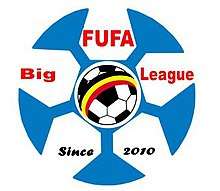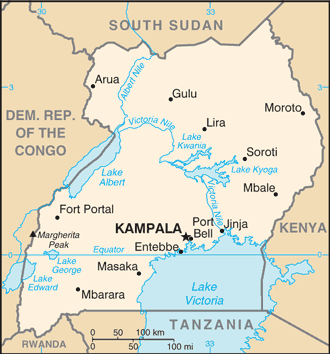FUFA Big League
The Ugandan Big League is the second tier of the Federation of Uganda Football Associations. The league was founded in 2009 and comprises two divisions known respectively as the Elgon Group and the Rwenzori Group .[1]
 | |
| Founded | 2009 |
|---|---|
| Country | Uganda |
| Confederation | CAF |
| Divisions | 2 |
| Number of teams | 18 |
| Level on pyramid | 2 |
| Promotion to | Ugandan Premier League |
| Relegation to | Regional Leagues |
| Domestic cup(s) | Ugandan Cup |
History
Original concept
The concept of re-structuring Ugandan football with the creation of a new second tier league was first mooted in October 2008 by the Federation of Uganda Football Associations. The idea that was single-handedly promoted by Eng. Moses Magogo was ridiculed, resisted, and fought by everyone. Although Magogo felt abandoned but he was buoyed by the inaugural clubs that were determined to proceed. Eventually out of persistence, Magogo won one by one convert and eventually the league was passed by the FUFA Executive Committee. The new national second division league, known as the FUFA Big League (FBL), was to cater for leading sides in the five regions. Second tier sides at that time competed at the regional level, with many of them failing to cope with advancement whenever they gained promotion to the national Super League.[2]
FUFA Competitions Committee secretary, Moses Magogo, confirmed that qualification to the Super League through the regional mini leagues would be ended and replaced by promotion through the national first division league. A major objective of the initiative was to help raise the standard of football outside the Super League.[2]
Administration
The FUFA Big League (FBL) is managed by the FUFA Competitions Committee and was launched on 6 August 6, 2009. The following clubs are eligible to play in the FBL:
- Clubs that participated in the Uganda Premier League (UPL) in the previous season and were relegated;
- Clubs that participated in the FBL in the previous season and were not relegated to the regional leagues;
- Clubs that participated in the FBL in the previous season and were not promoted to the UPL; and
- Clubs that are promoted from the FUFA Regional Competitions through an FBL Qualification Competition.[1]
If there are more than 16 clubs in the FBL it is divided into two groups with each group being run as a league competition. However, if there are less than 17 clubs, the competition will be run as a single group league competition.[1]
The Competitions Committee set stringent standards for member clubs covering computer literacy, a sound bank account, stadia that meet FUFA standards, qualified coaches and doctors.[3] The initial requirements for clubs included:
- Payment of a sh250,000 registration fee;
- An office or physical address with a fixed telephone line, fax and e-mail address;
- A secretary with a minimum O-level qualification;
- Signing of legal declaration form covering discipline; and
- Submission of bank statements to the FUFA Competitions Committee.[3]
Initial participants
The 16 clubs that competed in the first season of the FBL in 2009-10 were as follows:
| Participating clubs | Settlement | Position in the 2008/09 season |
|---|---|---|
| Bishop Nankyama FC | Bukalasa | Semi-finalists from Buganda Regional League |
| Devine Waters FC | Apac | Third placed team from North Regional Super Mini League |
| Fort Hills FC | Fort Portal | Third placed team from West Regional Super Mini League |
| Gulu United FC | Gulu | |
| Jinja Arsenal FC | Jinja | |
| Jinja Municipal Council Hippos FC | Jinja | Runner-up from East Regional Super Mini League |
| KASE FC | Kampala | Third placed team from Kampala Regional Super Mini League |
| Maroons FC | Kampala | Runners-up from Kampala Regional Super Mini League |
| Masaka Municipal Council FC | Masaka | |
| Mbale Heroes FC | Mbale | Third placed team from East Regional Super Mini League |
| Mbarara United FC | Mbarara | Fourteenth team in Uganda Super League |
| Misindye FC | Mukono | Third placed team from Buganda Regional Super Mini League |
| Ndejje University FC | Luwero | Runners-up from Buganda Regional Super Mini League |
| Samba Boys FC | Yumbe | Runners-up from North Regional Super Mini League |
| Sharing Youth FC | Kampala | Seventeenth team in Uganda Super League |
| UTODA FC | Kampala | Semi-finalists from Kampala Regional League |
Honours
Big League Championship Playoffs
| Season | Champions | Result | Runner-up | Venue |
|---|---|---|---|---|
| 2009-10 | Maroons FC | 2-0 | Gulu United FC | Masindi Municipal Stadium, Masindi |
| 2010-11 | Maji FC | 5-2 | Hoima-Busia FC | Njeru Stadium, Jinja |
| 2011-12 | Entebbe Young FC | 1-0 | Kiira Young | Namboole Stadium, Kampala |
| 2012-13 | Bright Stars FC | 2-1 | CRO FC | Mehta Stadium, Lugazi |
| 2013-14 | Lweza FC | 2-1 | Sadolin Bugembe FC | KCCA STADIUM, Lugogo |
| 2014–15 | Maroons FC | 1-0 | The Saints FC | Phillip Omondi Stadium |
| 2015–16 | Kirinya Jinja SS | 2-0 | Onduparaka FC | Nakivubo Stadium |
| 2016–17 | Maroons FC | 2-1 | Masavu FC | Phillip Omondi Stadium |
| 2017–18 | Ndejje University FC | 1-0 | Nyamityobora FC | Star Times Stadium, Lugogo |
| 2018–19 | Proline FC | 1-0 | Wakiso Giants FC | Star Times Stadium, Lugogo |
Big League Promotion Playoffs
| Season | Winners | Result | Runner-up | Venue |
|---|---|---|---|---|
| 2009-10 | UTODA FC | 1-0 | Misindye FC | Kampala |
| 2010-11 | Bul FC | 1-0 [aet] | Iganga Municipal Council FC | |
| 2011-12 | SC Victoria University | 4-0 | Aurum Roses FC | Namboole Stadium, Kampala |
| 2012-13 | Soana FC | 3-0 | Koboko FC | Mehta Stadium, Lugazi |
| 2015–16 | Proline FC | 4–1 | Sporting United (Lira) | Nakivubo Stadium |
| 2017–18 | Paidha Black Angels FC | 0–0 (p. 4-2) | Kitara FC | Star Times Stadium, Lugogo |
| 2018-19 | Kyetume FC | 4–1 | Kansai Plascon FC | Star Times Stadium, Lugogo |
Big League Group honours
Elgon Group
| Season | Group Winners | Playoff Qualifier 1 | Playoff Qualifier 2 |
|---|---|---|---|
| 2009-10 | Gulu United FC (P) | UTODA FC (P) | |
| 2010-11 | Hoima-Busia FC (P) | Bul FC (P) | Iganga Municipal Council FC |
| 2011-12 | Entebbe Young FC (P) | Mbarara Old Timers FC | CRO FC |
| 2012-13 | CRO FC (P) | Soroti Garage FC | Mbale Heroes FC |
| 2013-14 | Sadolin Paints FC (P) | KJT Rwenshama (P) | Kirinya Jinja SSS |
| 2014-15 | Maroons FC (P) | ||
| 2015-16 | |||
| 2016-17 | Maroons FC (P) | Ndejje University | Kiira United |
| 2017-18 | Ndejje University (P) | Paidha Black Angels (P) | Kyetume FC |
| 2018-19 | Wakiso Giants FC (P) | Kyetume FC (P) | UPDF |
Rwenzori Group
| Season | Group Winners | Playoff Qualifier 1 | Playoff Qualifier 2 |
|---|---|---|---|
| 2009-10 | Maroons FC (P) | Misindye FC | |
| 2010-11 | Maji FC (P) | Boroboro Tigers FC | CRO FC |
| 2011-12 | Kiira Young (P) | SC Victoria University (P) | Aurum Roses FC |
| 2012-13 | Bright Stars FC (P) | Soana FC (P) | Koboko FC |
| 2013-14 | Lweza FC (P) | Baza Holdings | Mutundwe Lions |
| 2014-15 | The Saints FC (P) | ||
| 2015-16 | |||
| 2016-17 | Masavu FC (P) | Synergy FC | Mbarara City FC (P) |
| 2017-18 | Nyamityobora FC (P) | Kitara FC | Kabale Sharp FC |
| 2018-19 | Proline FC (P) | Kansai Plascon FC | Dove FC |
Player Honours
| Season | Most Valuable Player | Top Scorer |
|---|---|---|
| 2014–15 | Fred Kalanzi, Lweza FC (9 goals) | |
| 2015–16[6] | Muhammad Shaban, Onduparaka FC | Edrisa Lubega, Proline FC (19 goals) |
| 2016–17[7] | Patrick Kaddu, Maroons FC (16 goals) | |
| 2017–18 | ||
| 2018–19[8] | Bright Anukani, Proline FC | Ivan Bogere, Proline FC (14 goals) |
Sponsorship
On 1 November 2013 it was announced that the Airtel Telecommunications company had signed a four-year contract providing a total of 400 million shillings (about 160,000 US dollars) towards funding different activities under both the FUFA Big League and the Ugandan Cup until 2016.[9]
Footnotes
- "FUFA BiG League" (Facebook). FUFA. Retrieved 2014-01-15.
- "Big league introduced". NewVision. 2008. Archived from the original on 2014-01-16. Retrieved 2014-01-15.
- "FUFA sets tough rules for BIG League clubs". NewVision. 2010. Archived from the original on 2014-01-16. Retrieved 2014-01-16.
- "Uganda 2009/10 - RSSSF (Hans Schöggl and Ian King )". RSSSF Archive. 2009/10. Retrieved 2014-01-16. Check date values in:
|year=(help) - "FUFA Welcomes Five More Football Clubs to the Big League". Uganda Radio Network. 2010. Retrieved 2014-01-17.
- Mugabi, Sully. "Jinja SS Crowned 2015-16 Big League Champions".
- Achan, Jacky (8 May 2017). "How Maroons clinched FUFA Big League title".
- Isabirye, David. "Kyetume 4-1 Kansai Plascon: The Slaughters promoted to the Uganda Premier League".
- "Big League clubs hail FUFA President, Airtel". FUFA. 2013. Retrieved 2014-01-17.
